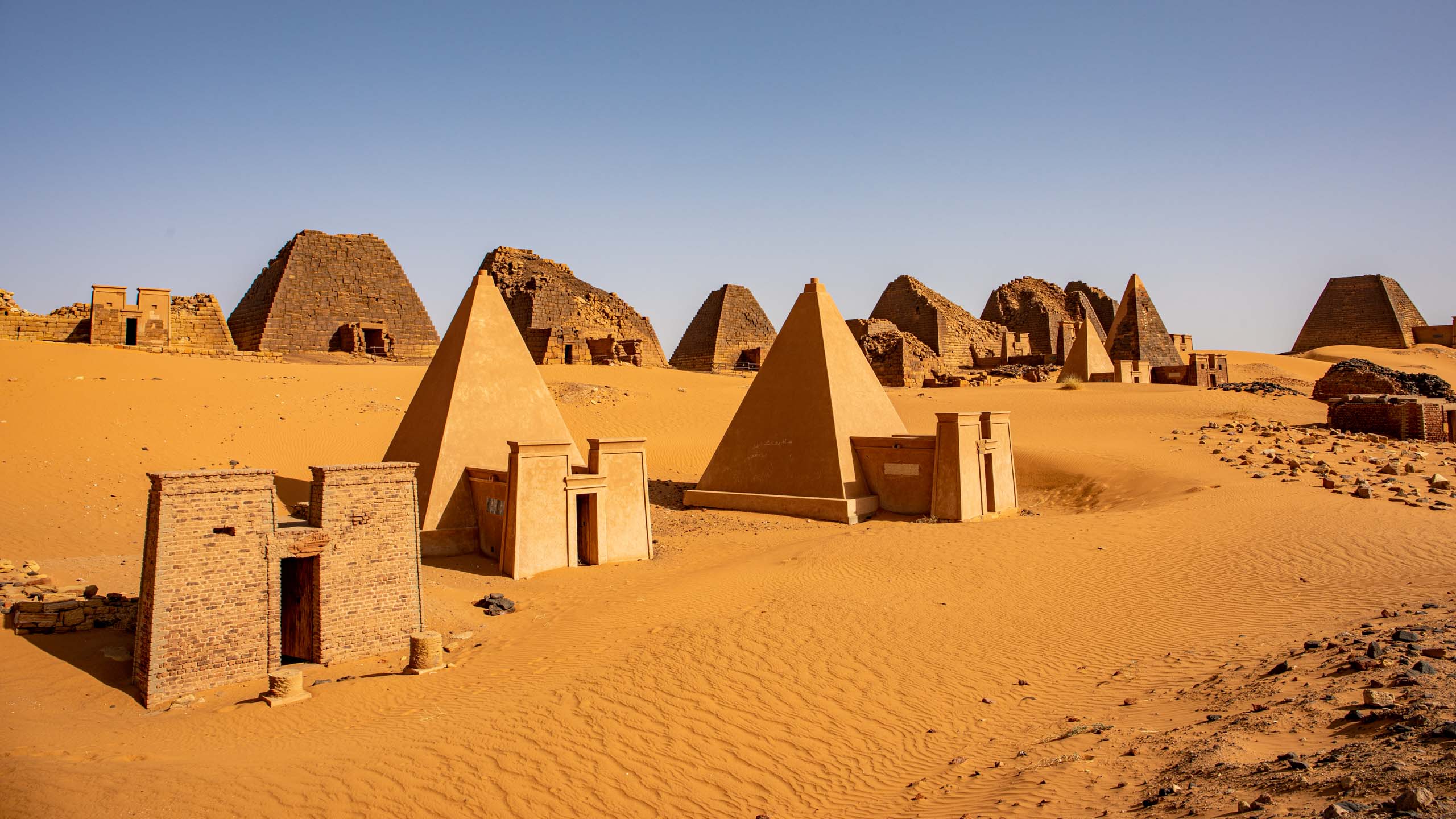
Sudan, the largest country in Africa, is a land of rich history, vibrant culture, and diverse landscapes. Located in northeastern Africa, Sudan is bordered by Egypt, Libya, Chad, Central African Republic, South Sudan, Ethiopia, and Eritrea. With a population of over 40 million people, Sudan is home to a fascinating mix of ethnic groups, languages, and religions.
In this article, we will explore 50 intriguing facts about Sudan that shed light on its ancient civilization, natural wonders, notable landmarks, and cultural heritage. From the majestic Nile River and ancient pyramids to the bustling markets and delicious cuisine, Sudan offers a myriad of experiences for travelers and history enthusiasts alike.
Join us on this virtual journey as we uncover the hidden gems and fascinating aspects of Sudan that make it a truly remarkable country in Africa.
Key Takeaways:
- Sudan, the largest country in Africa, boasts ancient pyramids, diverse wildlife, and a rich tradition of storytelling, making it a fascinating destination for history and nature enthusiasts.
- With a vibrant culture, diverse climate, and warm hospitality, Sudan offers a wealth of experiences for visitors, from exploring archaeological treasures to immersing in traditional music and dance.
Sudan is the largest country in Africa.
Sudan covers an area of approximately 2.5 million square kilometers, making it the third-largest country in Africa and the 16th largest in the world.
The capital of Sudan is Khartoum.
Khartoum is not only the capital but also the largest city in Sudan, located at the confluence of the White Nile and Blue Nile.
Sudan is home to more than 40 million people.
With a population exceeding 40 million, Sudan is one of the most populous countries in Africa.
The official language of Sudan is Arabic.
Arabic is the primary language spoken in Sudan, reflecting the country’s cultural and historical ties to the Arab world.
Sudan gained independence from British colonial rule in 1956.
After years of colonization, Sudan achieved independence and became a sovereign nation on January 1, 1956.
Sudan is known for its rich cultural diversity.
Sudan is home to numerous ethnic groups, each with its own traditions, languages, and customs, contributing to the country’s cultural vibrancy.
The Sudanese pound is the official currency of Sudan.
The Sudanese pound has been the national currency of Sudan since 2011, replacing the Sudanese dinar.
Sudan has a diverse climate.
From the arid deserts in the north to tropical rainforests in the south, Sudan experiences a range of climates across its vast territory.
The Nile River flows through Sudan.
The mighty Nile River, the longest river in the world, passes through Sudan, providing a crucial water source for the country and its agriculture.
Sudan is known for its ancient pyramids.
Sudan is home to numerous archaeological sites, including the Meroe pyramids, which date back to the ancient Kingdom of Kush.
Sudan was once ruled by ancient Nubian kingdoms.
The territory of present-day Sudan was once part of the powerful Nubian civilization, which flourished along the Nile River thousands of years ago.
Sudan has several UNESCO World Heritage sites.
From the Archaeological Sites of the Island of Meroe to the Sanganeb Marine National Park, Sudan boasts several sites of outstanding universal value.
The majority of Sudanese people practice Islam.
Islam is the dominant religion in Sudan, with the majority of the population being Muslims. The country also respects religious diversity and protects the rights of religious minorities.
Sudan is known for its vibrant traditional music and dance.
The Sudanese music scene is characterized by traditional instruments, rhythmic beats, and expressive dance forms, reflecting the country’s rich cultural heritage.
Sudan is a land of ancient civilizations.
From the Kingdom of Kush to the powerful pharaohs of ancient Egypt, Sudan has seen the rise and fall of numerous ancient civilizations.
Sudan is a major producer of gum arabic.
Gum arabic, a natural product derived from various species of Acacia trees, is a valuable export commodity for Sudan, with the country being one of the largest producers in the world.
The Sudanese cuisine is diverse and flavorful.
Sudanese cuisine features a mix of African, Arab, and Middle Eastern influences, with staple foods such as millet, sorghum, and lentils, along with spiced meats and vegetable dishes.
Sudan has a rich tradition of storytelling.
Storytelling plays a significant role in Sudanese culture, with folktales and oral traditions being passed down through generations, preserving history and moral values.
Sudan is known for its colorful traditional attire.
The Sudanese people take pride in their traditional clothing, which often includes vibrant fabrics, intricate embroidery, and distinctive patterns.
Sudan has a unique blend of modern and traditional architecture.
From ancient ruins and mosques to contemporary buildings, Sudan’s architecture reflects its history and contemporary urban development.
Sudan is home to diverse wildlife.
The country’s national parks and reserves are home to a wide range of animals, including lions, elephants, giraffes, and various bird species.
Sudan is a major exporter of agricultural products.
Sudan’s fertile soil and favorable climate make it an important producer and exporter of crops such as cotton, sorghum, sesame, and gum arabic.
Sudan has a rich tradition of traditional medicine.
Traditional healing practices, using herbal remedies and natural ingredients, are still prevalent in Sudan, passed down through generations.
Sudan has a strong tradition of hospitality.
Sudanese people are known for their warm and welcoming nature, often inviting guests to share meals and experience the country’s culture firsthand.
Sudan has a diverse range of traditional crafts.
From vibrant woven baskets and pottery to intricate woodwork and silver jewelry, Sudan’s traditional crafts showcase the skill and creativity of its artisans.
The Sudanese tribes have unique cultural identities.
The different tribes in Sudan have distinct cultural practices, languages, and customs, adding to the country’s cultural mosaic.
Sudan is a popular destination for archaeological enthusiasts.
With its rich history and archaeological sites, Sudan attracts tourists and researchers interested in exploring ancient civilizations and monumental structures.
Sudan has a developing film industry.
The Sudanese film industry is gaining recognition both locally and internationally, with filmmakers contributing to the country’s cultural expression through storytelling.
Sudanese cuisine includes flavorful spice blends.
Spices such as cumin, coriander, and Sudanese pepper are commonly used in Sudanese dishes, adding depth and complexity to the flavors.
Sudanese weddings are vibrant and festive.
Sudanese weddings are often grand celebrations, filled with traditional music, dancing, and elaborate ceremonies.
Sudan is home to the Sudanese Jazz Orchestra.
The Sudanese Jazz Orchestra is a renowned musical ensemble that combines traditional Sudanese music with jazz elements, creating a unique sound.
Sudan hosts the Sudan International Film Festival.
The Sudan International Film Festival showcases local and international films, promoting cultural exchange and creativity in the film industry.
The Sudanese flag consists of three horizontal stripes.
The Sudanese flag features three equal horizontal stripes: red, white, and black, with a green triangle on the hoist side.
Sudan has a diverse range of traditional dances.
From the Zar dance to the Dabka, Sudanese traditional dances are characterized by rhythmic movements, colorful costumes, and energetic performances.
Sudan is home to the Sennar Dam.
The Sennar Dam, located on the Blue Nile, is one of Sudan’s largest dams, providing hydroelectric power and irrigation for agricultural purposes.
Sudan has a rich history of literature.
Sudanese authors have contributed to the literary world with their novels, poetry, and works of non-fiction, exploring various themes and issues.
Sudanese art reflects cultural and political expressions.
Sudanese artists use various mediums to express their identity, explore social issues, and comment on political events, showcasing the power of art as a form of activism.
Sudan has a range of traditional sports.
Traditional sports in Sudan include wrestling, horse racing, and stick fighting, providing entertainment and fostering community bonding.
Sudan is known for its colorful festivals.
Festivals such as Eid al-Fitr and Eid al-Adha are celebrated with great joy and enthusiasm, bringing communities together to mark religious occasions.
Sudan has a growing youth population.
A significant percentage of Sudan’s population consists of young people, contributing to the country’s dynamic and vibrant energy.
Sudan is a member of the United Nations.
Sudan joined the United Nations on November 12, 1956, after gaining independence, and continues to play an active role in international affairs.
Sudan has a mix of traditional and modern healthcare practices.
Traditional healers work alongside modern medical facilities, providing alternative forms of treatment that are deeply rooted in cultural beliefs and practices.
Sudan has a strong tradition of oral poetry.
Oral poetry, known as hikayat, holds great significance in Sudanese culture, offering a medium of storytelling and preserving historical narratives.
Sudan is a land of archaeological treasures.
From ancient tombs to historical ruins, Sudan boasts a wealth of archaeological discoveries that shed light on its rich past.
Sudan is home to the Sudan National Museum.
The Sudan National Museum in Khartoum showcases a vast collection of artifacts and exhibits, providing insights into Sudan’s archaeology and cultural heritage.
Sudan has a rich tradition of coffee drinking.
Coffee, known as “jebena,” is an integral part of Sudanese culture, often served in social gatherings and as a gesture of hospitality.
Sudan is a hub for African fashion.
Sudanese designers are making waves in the fashion industry, blending traditional elements with contemporary styles and showcasing Sudan’s unique aesthetic.
Sudan has a variety of traditional musical instruments.
The Sudanese musical landscape is enriched by instruments such as the tambour, oud, and the armpit fiddle, each adding distinct sounds to traditional music.
Sudan has a strong tradition of communal farming.
Community-based agricultural practices, such as collective farming and sharing of resources, are prevalent in Sudan’s rural areas.
Sudan has a unique tea culture.
Tea, known as “shai,” holds cultural significance in Sudan, often prepared with aromatic herbs and spices, and served as a gesture of hospitality.
These 50 facts about Sudan provide a glimpse into the diverse culture, rich history, and natural beauty of this fascinating country. From its ancient pyramids and archaeological sites to its vibrant traditions and warm hospitality, Sudan offers a wealth of experiences for both locals and visitors alike. Explore the bustling streets of Khartoum, marvel at the ancient ruins, or immerse yourself in the country’s vibrant music and art scene. Discover the hidden gems of Sudan as you uncover the secrets of this remarkable African nation.
Conclusion
In conclusion, Sudan is a country rich in history, culture, and natural beauty. With its diverse landscapes, ancient civilizations, and vibrant traditions, Sudan offers a unique experience for travelers and historians alike. From the majestic pyramids of Meroe to the breathtaking beauty of the Nile River, there is no shortage of wonders to explore in Sudan. The country’s warm and welcoming people, delicious cuisine, and bustling markets add to its charm. Despite facing various challenges, Sudan continues to evolve and grow, opening its doors to the world and showcasing its hidden treasures. Whether you are interested in history, nature, or simply looking for an authentic cultural experience, Sudan is a destination that should be on your bucket list.
FAQs
1. What is the capital city of Sudan?
The capital city of Sudan is Khartoum.
2. What is the official language of Sudan?
The official language of Sudan is Arabic.
3. What is the currency used in Sudan?
The currency used in Sudan is the Sudanese pound (SDG).
4. Is Sudan a safe country to visit?
Safety conditions can vary, and it is advised to check travel advisories before planning your trip. However, with proper precautions and research, many tourists have enjoyed their visits to Sudan.
5. What are some popular tourist attractions in Sudan?
Some popular tourist attractions in Sudan include the ancient pyramids of Meroe, the Nubian Desert, the Nile River, and the capital city of Khartoum.
6. What is the climate like in Sudan?
Sudan has a hot desert climate, with high temperatures throughout the year. It is advisable to visit during the cooler months between November and February.
7. Are there any cultural customs that should be respected in Sudan?
Respecting local customs and traditions is important in Sudan. It is recommended to dress modestly, especially in religious and conservative areas, and to seek permission before taking photographs of people.
8. Can I visit Sudan for business purposes?
Yes, Sudan can be a destination for business travelers, with various industries and opportunities available. It is advisable to familiarize yourself with the local business customs and regulations beforehand.
9. Are there any visa requirements for Sudan?
Yes, travelers to Sudan usually require a visa. It is best to check with the Sudanese embassy or consulate in your country for specific requirements and application procedures.
10. Is Sudan a landlocked country?
No, Sudan has access to water through the Red Sea to the northeast.
Sudan's rich history, diverse culture, and stunning landscapes offer endless opportunities for exploration. From the bustling streets of Port Sudan to the unique challenges faced by South Sudan, there's always more to learn about this fascinating country. For those seeking even more intriguing facts about Sudan, our collection of 20 additional tidbits is sure to satisfy your curiosity.
Was this page helpful?
Our commitment to delivering trustworthy and engaging content is at the heart of what we do. Each fact on our site is contributed by real users like you, bringing a wealth of diverse insights and information. To ensure the highest standards of accuracy and reliability, our dedicated editors meticulously review each submission. This process guarantees that the facts we share are not only fascinating but also credible. Trust in our commitment to quality and authenticity as you explore and learn with us.


